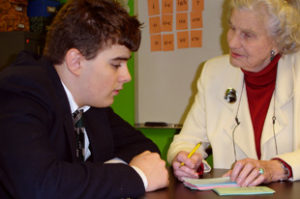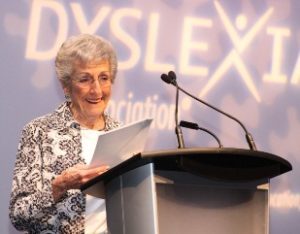2011
By Karen Dakin, Secretary of IDA
The International Dyslexia Association is moving forward with Strategic Initiatives, making progress in so many arenas including developing tools to support state literacy laws and creating a grassroots legislative network, implementing the Knowledge and Practice Standards for Teachers of Reading, enhancing communication with IDA’s members and leaders through the monthly electronic newsletter, The Examiner, and IDA in an Instant, a bi-weekly news/special interest publication, to name a few. Since IDA is likely the oldest organization supporting students with language based learning disorders in the United States, in addition to its current energizing programs, IDA’s history is fascinating and illuminating.
To recognize IDA’s extraordinary legacy, two of IDA’s Pioneers will be recognized at IDA’s 62nd Annual conference being held at the Hilton Chicago November 9-12, 2011. These women, both recipients of IDA’s highest honor, The Samuel T. Orton Award, Diana Hanbury King in 1990 and Sylvia Onesti Richardson in 1992, have made enormous contributions to the understanding and treatment of dyslexia world –wide, impacting the fields of education, speech and language and medicine.
Dr. Diana King began her career as a teacher in Southern Rhodesia where she fell in love with teaching. She, like Dr. Sylvia Richardson, was and is a lover of language. Diana spoke Italian, German and French and taught Latin, as well. She discovered that combining her passion for teaching with her passion for language still did not allow her to successfully teach some obviously bright and motivated students, including her young nephew living in Africa. She is well known for placing the onus for a student not learning on the teacher, not the student. I have heard her say with conviction, “When a child is not learning, the teacher is not teaching.” Fortunately, for those of us touched by her dedication to teaching each child, Diana found herself teaching at the Sidwell Friends School where she learned about the Orton-Gillingham approach. Although her mentor at the time, Helene Durbrow, guided Diana’s mastery of the multisensory, sequential program, Diana also received guided instruction from Anna Gillingham, herself. It was Helene Durbrow who brought Diana to her first Orton Society meeting in 1950 or 1951. This year we are celebrating Diana’s 60th year as a member of IDA, having first joined in 1951!
Diana’s intellect, passion, knowledge and energy supported her when she took on the incredibly challenging task of founding in 1955 and running an eight week summer tutorial program in western Pennsylvania that she named Camp Dunnabeck. Today, Camp Dunnabeck is a six week tutorial program that is part of the school Diana also started called Kildonan School, founded in 1969, and now on a 460 acre campus in the foothills of the Berkshires in Amenia, New York. Together they provide year round programming to support students with dyslexia- with Camp Dunnabeck being a co-ed camp for students ages 8-16, and Kildonan School being a co-ed school for students in grades 2-12. Kildonan School’s elementary program, grades 2-6, is a day school program; whereas, its secondary program is about 70% residential. Diana’s vision has created this camp and school that so carefully and caringly provide marvelous, cutting edge education for students with dyslexia. Diana did not stop with the legacy of her camp and school. Along with the development of Kildonan’s teacher training program that has become a model teacher training program, Diana has also created and published teaching materials that have been used by thousands of educators, particularly in the area of teaching written language skills. Finally, Diana has become committed to sharing her gifted and caring teaching with inmates in a maximum security prison where an estimated 60 percent of the inmates are illiterate. She has shared her devotion to teaching and literacy with those individuals seeking the gift of reading after years of failure and frustration.
Dr. Sylvia Onesti Richardson, the eighth President of the Orton Dyslexia Society, now the International Dyslexia Association, was described by Rosemary Bowler upon her presentation of the Samuel T. Orton Award in 1992 to Sylvia as “perhaps the most articulate, traveled, and acclaimed spokesperson for dyslexia in the nation.” Sylvia’s involvement with the education, speech-language and medical communities helped to cross-fertilize the cutting-edge research with which she and other members of the Society were engaged, thus helping to disseminate this critical information. Sylvia has been President of the American Speech-Language- Hearing Association (ASHA), Chair of the Professional Advisory of the Learning Disabilities Association (LDA), Chair of the National Joint Committee on Learning Disabilities, and President of the Multidisciplinary Academy of Clinical Education. She has written or helped to write over 100 publications and has received honors and awards from these organizations.
Having been active in so many organizations supporting learning disabilities, why has the Orton Society, now the International Dyslexia Association, been so fortunate to have secured her devotion to its mission? In her own words stated during her acceptance of the Samuel T. Orton Award, Sylvia explains why the Orton Society/IDA has been so important to her. “Suddenly, amazingly, it was like coming home. Although I had been active for many years in diverse organizations concerned with pediatrics, speech-language and hearing, Montessori education, and learning disabilities, it was here with you in the ODS that all the bits and pieces converged. Here was a truly multidisciplinary group, individuals representing medicine, speech-language and hearing, psychology, reading, education, special education, early childhood education, and parenting, focused from their diverse perspectives on all facets of language and its disorders. It was like a sudden illumination that can occur when tunnelers from different sides of a mountain manage to meet in the center and the light comes in from all sides.”
Sylvia was able to make and continues to make an immense contribution to the field of learning disabilities because she herself is multidisciplinary! Sylvia was originally interested in theater and received her BA from Stanford University in speech and drama. She became interested in speech-language pathology at the University of Washington where she started in their drama program and then switched to speech and language disorders. Sylvia received her MA from Columbia University in Education of the Handicapped, and then received her MD degree from McGill University. Sylvia pursued her MD degree because she felt that parents often went to their pediatrician when they were concerned about their child’s language problems. She holds a Montessori Diploma and a Certificate in Clinical Competence in Speech Pathology, as well as an Honorary Doctor of Literature from Emerson College. Dr. Richardson and Dr. Sydney Farber, a preeminent pediatrician, established the first speech-language clinic at a children’s hospital, Boston Children’s Hospital. Sylvia summarizes her love affair with language by saying, “To make it short: I was always concerned with language, which includes gesture, speaking, reading and writing.” How fortunate for IDA that Sylvia found her home with IDA.
Please join Mark Westervelt, Helene Durbrow’s grandson, and me as we honor these extraordinary women at Session F32, Tribute to IDA Pioneers, Dr. Diana Hanbury King and Dr. Sylvia Onesti Richardson, from 3:15 pm to 5:15 pm on Friday, November 11, 2011. We will share videotapes in which Diana and Sylvia share amazing insights into to their long and courageous careers. There will be a reception where attendees will be able to meet and greet the honorees.
Copyright © 2011 International Dyslexia Association (IDA). We encourage sharing of Examiner articles. If portions are cited, please make appropriate reference. Articles may not be reprinted for the purpose of resale. Permission to republish this article is available from info@interdys.org.



